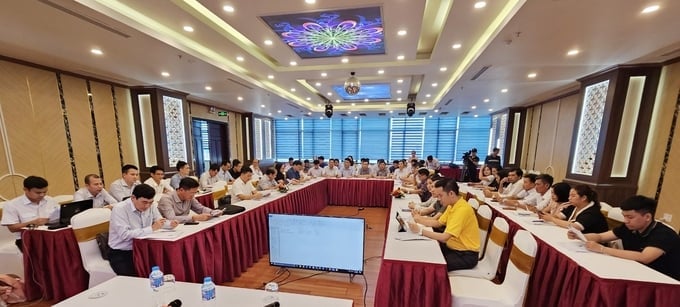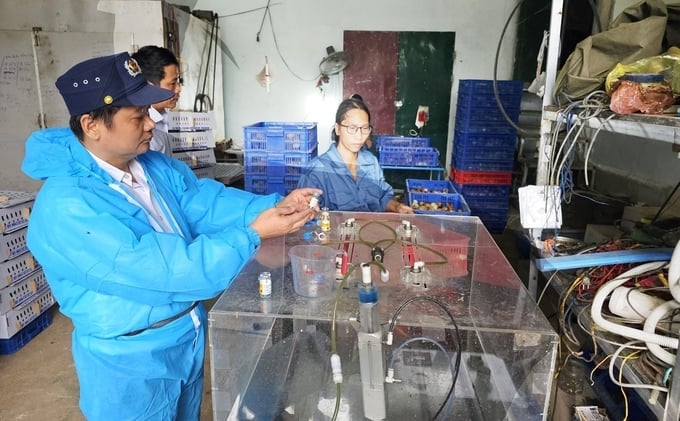November 25, 2025 | 12:59 GMT +7
November 25, 2025 | 12:59 GMT +7
Hotline: 0913.378.918
November 25, 2025 | 12:59 GMT +7
Hotline: 0913.378.918

Workshop on digital transformation in the animal health sector in Quang Binh province. Photo: T. Phung.
According to Mr. Tran Dinh Hiep, Deputy Director of the Quang Binh province's Department of Agriculture and Rural Development, digital transformation and the application of information technology and digital techniques in agriculture, livestock production and animal health efforts, represent an essential trend of the fourth Industrial revolution.
Quang Binh is one of the first nine provinces nationwide to organize a workshop to initiate digital transformation in the field of livestock production and animal health in 2023.
Mr. Hiep further emphasizes the application of digital transformation in disease management on land and in animal health efforts, outlining a direction to meet development needs. "The high-tech application in the digital transformation of the livestock production and animal health sector in Quang Binh province serves as a significant impetus for increasingly effective animal health efforts," stated Mr. Hiep.
However, the implementation of digital transformation remains a challenging task for the animal health workforce in Quang Binh province. According to Mr. Tran Cong Tam, Director of the Quang Binh province's Department of Agriculture and Rural Development, the unit has engaged in meetings, discussions, and sought advice from organizations specializing in information technology and universities with expertise in livestock production and animal health to acquire specific guidance for this mission.
"These are important foundations to find a common direction for the digital transformation in the animal health sector, thereby contributing to sustainable livestock development," Mr. Tam added.
According to the Quang Binh province's Sub-Department of Livestock Production and Animal Health, there are currently 428 livestock farms throughout the province in compliance with Decree No. 13/2020/ND-CP. Namely, there are 9 large-scale farms, 95 medium-scale farms, and 324 small-scale farms. A small number of farms have applied advanced technology to agricultural production, yielding effective results and contributing to the restructuring of animal husbandry.
Accordingly, these livestock farms have adopted advanced closed-loop breeding processes, organic farming methods, automated cooling systems, probiotic fermented feed, bio-bedding, and waste treatment using biogas.
We joined a delegation from the Quang Binh province's Sub-Department of Livestock Production and Animal Health to visit a poultry breeding farm in Van Ninh commune, Quang Ninh district. Mr. Tran Thanh Ngoc, the farm owner, mentioned that the farm annually supplies 50,000 breeding chickens to serve farmers in the market.
The farm employs automated technology in the processes of feed conversion and water supply for the livestock. The egg incubators are also automated, leading to a very high successful hatching rate. Before the breeding chickens are released, they are vaccinated and sprayed with medicine through an automated system supervised by animal heatlh staff.
"Thanks to the automated system, our breeding chickens are guaranteed to be disease-free at the time of sale, and the poultry farmers can produce commercial chickens within four months. Through digital transformation and technology adoption, our breeding, care, disease prevention, and the efficient consumption of breeding chickens have been improved," stated Mr. Ngoc.

Utilizing chemical spraying technology to prevent diseases in the chicken flock before sale can ensure safe disease control. Photo: T. Phung.
An Viet High-Tech Agriculture Limited Company has invested in constructing two high-tech duck breeding houses, accommodating a scale of 15,000 market ducks in Son Thuy commune, Le Thuy district, Quang Binh province.
Mr. Thai Hoa Nam, Director of An Viet Company, shared, "We have built a food storage area to supply 15,000 market ducks per batch, and set up a Biogas tank to manage waste and breeding wastewater."
The majority of processes in the high-tech duck production chain has been automated. Accordingly, the breeding pens are equipped with automatic feeding and water supply systems, and have a temperature-controlled cooling system which adjusts according to each stage of the ducks' growth and development.
Furthermore, wastewater from floor sanitization is collected and transfered to the biogas tank for treatment and reuse. Consequently, the ducks are exceptionally healthy, minimizing the risk of disease.
With timely guidance and supervision from the Quang Binh province's Sub-Department of Livestock Production and Animal Health, positive transformations have been observed in animal health efforts. Outbreak of diseases in livestock, poultry, and aquaculture production has decreased considerably compared to the same period in 2022.
Mr. Tran Cong Tam stated that digital transformation has significantly supported animal health management within the province. Despite the limited workforce overseeing multiple sectors, digital transformation and high-tech application have supported with supervision, timely updates, and clarity. Additionally, prompt detection and containment of animal and aquatic diseases have notably reduced losses for local residents.
Translated by Nguyen Hai Long

(VAN) Heavy rains make aquatic species more vulnerable to disease. Proactive water management and high-tech systems help farmers prevent outbreaks and protect yields.

(VAN) Greenhouses are shifting production mindsets in Binh Lu commune, enabling farmers to ‘weather the sun and rain’ and secure stable vegetable harvests throughout the year.

(VAN) Green transition is crucial for the Mekong Delta amid climate change and stricter standards, offering a path toward sustainability.

(VAN) Dong Thap promotes agricultural restructuring, forms large specialized farming zones, raises the value of agricultural products and develops toward ecological and high-tech directions.
/2025/11/22/4018-4-213342_747.jpg)
(VAN) The Mekong Delta Agricultural Experts Club has attracted 143 experts and researchers to participate in providing consultancy and contributing initiatives to the development of one million hectares of high-quality rice.

(VAN) Ca Mau’s development of OCOP products opens a path to increasing cooperatives value, helping boost income, expand markets, and affirm collective economy's role.

(VAN) Turning seemingly ordinary coconut shells into unique jewelry and artwork, Nguyen Bang Nhi spreads the value of local culture through her brand, Cocohand.